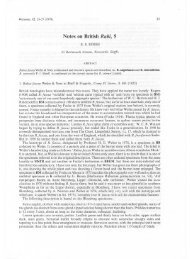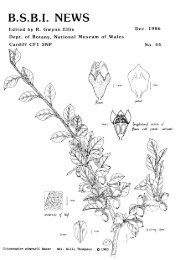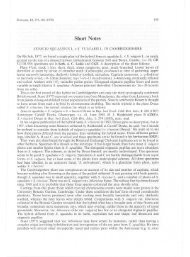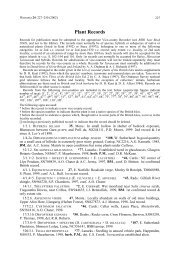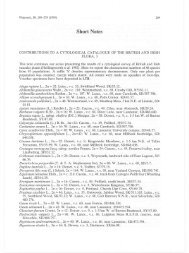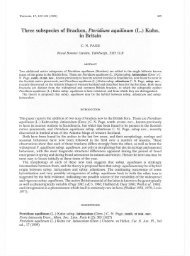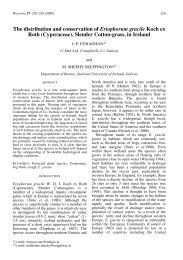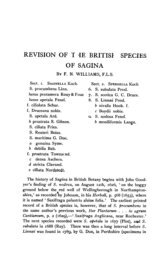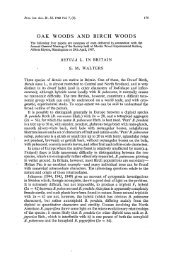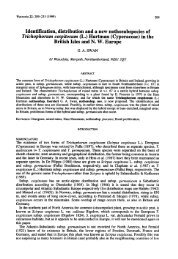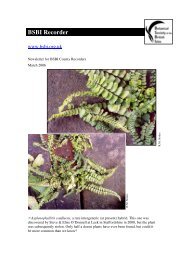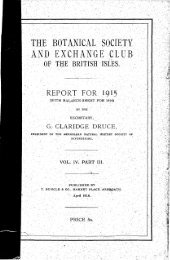You also want an ePaper? Increase the reach of your titles
YUMPU automatically turns print PDFs into web optimized ePapers that Google loves.
A BOTANICAL TOUR AMONG THE SOUTH SEA ISLANDS. 119<br />
Lichee of China, although a much larger and more delicious fruit, occurs here,<br />
as also in the Fi-iendly Islands and the Fijis. It is caUed by the Samoans<br />
Tara, at Tavou (a group of the Friendly Islands) it is known as Dava, and<br />
in the Fijian dialect Lauva. When first I met with the tree at Upolu, I was<br />
a beautiful specimen, about 45 feet high,<br />
standing on the side of a mountain ;<br />
was towering above the dwarf, but pretty shrubs that surrounded it in the<br />
valley beneath. Not knowing at the time that a great peculiarity of the tree<br />
is its fiery I'ed, immature leaves, which, contrasted with the grassy-green of<br />
the full-grown ones in the distance, are really charming, more especially when<br />
the dense foliage of a Calophi/Uum, or a Eugenia Malaccensis, forms a back-<br />
ground,—I quickly descended, thinking that I had discovered something new.<br />
My native guides kept close to me, saying, Tava tava, at the same time<br />
putting their hands to their mouths and smacking their lips, to signify that the<br />
tree I so eagerly rushed to, bore an edible fruit. Eugenia Malaccensis is also<br />
an excellent fruit, and, Uke Sapindus pinnatus, it is to be found in most of the<br />
South Sea Islands. I have seen several fine varieties of it in the Fijis, vei-y<br />
different from the one called Fekeka in the Samoas, and wliich I believe is the<br />
same as the one at Yavou, Friendly Islands, called Fegeka. At Burretta, the<br />
private residence of Mr. Thurston, H.M. Consul at Fiji, my attention was<br />
called to a scarlet and a yellow fruitjng variety growing side by side, and both<br />
had flowers corresponding in colour with their fruit, which were the same in<br />
size and taste, and the trees themselves were about the same lieight. The Ti-<br />
apple (Eoea dulci-o) seems to be more plentiful in Upolu than in most of the<br />
islands ; it is an excellent fruit, and a very ornamental tree. Some very fine<br />
specimens of it occur in the mountains above Apia, and at the time of my<br />
visit the ground was strewed, even for a distance, with their delicious fruit,<br />
which is of a golden-yeUow colour, perfectly oval, very juicy, and weighs gene-<br />
rally about three-quarters of a pound. The tree bears two crops in the year.<br />
The Plantain and the Banana are common almost everywhere. Musa Caven-<br />
dishi, of China, which I have found in many of the islands, Mr. Williams,<br />
H.M. Consul at Samoa, informed me was first introduced by his father (the<br />
Rev. John Williams), from the Duke of Devonshire's garden many years ago.<br />
It has been introduced into most of the islands by native missionary teachers.<br />
There are a great many varieties of the Plantam and the Banana among the<br />
islands, and there were at least twenty-five kinds among those we visited. I<br />
met with a very remarkable species in a plantation in the Fijis. The foliage<br />
was of a rich purple, and had a most beautiful effect, mingled with the varie-<br />
gated foliage ai'ound. I attempted to take up a small plant of this beautiful<br />
variety, but was immediately prevented by the natives. Tobacco, calico, and<br />
even money, were offered for it, but to no purpose. I afterwards learnt from<br />
a settler, that it is customary with the Polynesians to plant ornamental foliage<br />
near to their houses in honour of their deceased relatives, and that to break<br />
one of those plants is considered an atrocious crime, punishable by death. I<br />
recollect, at Tutuila, having attempted to pull up a small plant oiAralia, near<br />
to a village, when a yoimg chief rushed forward, bawling as loudly as possible,<br />
Tabu tabu (forbidden), and from his excited appearance I should think that,



